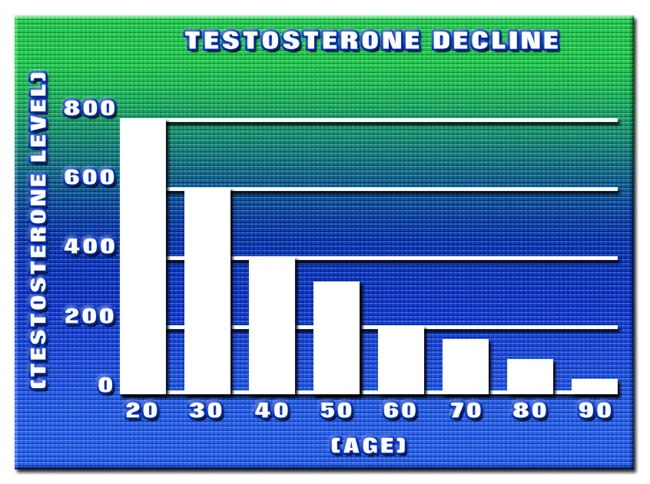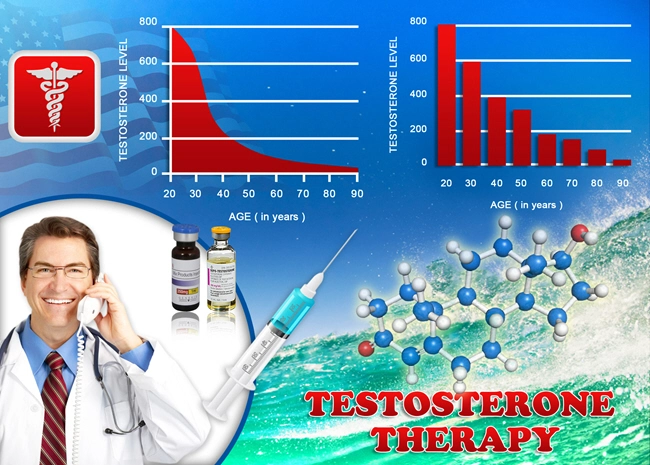
Introduction to Testosterone Replacement Therapy
Testosterone Replacement Therapy (TRT) has become an increasingly popular treatment for men experiencing symptoms of low testosterone, a condition known as hypogonadism. This therapy aims to restore testosterone levels to a normal range, thereby improving quality of life and mitigating associated health risks. For American males considering or currently undergoing TRT, understanding the nuances of monitoring and adjusting this therapy is crucial for achieving optimal outcomes.
The Importance of Regular Monitoring
Monitoring is a cornerstone of successful TRT. It involves regular assessments to ensure that testosterone levels are within the therapeutic range and that the therapy is not causing adverse effects. American males on TRT should undergo periodic blood tests to measure serum testosterone levels, typically every three to six months after initiating therapy, and annually thereafter if stable. These tests help healthcare providers adjust dosages and tailor treatment plans to individual needs.
Key Parameters to Monitor
Several key parameters should be closely monitored during TRT. These include total testosterone levels, free testosterone levels, and hematocrit, which measures the volume percentage of red blood cells in blood. Elevated hematocrit levels can indicate an increased risk of blood clots, necessitating a dosage adjustment or temporary cessation of therapy. Additionally, monitoring lipid profiles and prostate-specific antigen (PSA) levels is essential to assess cardiovascular and prostate health, respectively.
Adjusting TRT: A Personalized Approach
Adjustments to TRT are often necessary to maintain therapeutic efficacy and minimize side effects. The dosage may need to be altered based on the individual's response to treatment, which can vary widely. Some men may require higher doses to achieve symptom relief, while others might need lower doses to avoid side effects such as acne, mood swings, or sleep apnea. It is imperative for American males to work closely with their healthcare providers to find the right balance.
Potential Side Effects and Management
While TRT can significantly improve quality of life, it is not without potential side effects. Common issues include skin reactions at the application site, fluid retention, and changes in libido. More serious concerns, such as an increased risk of cardiovascular events or prostate cancer, require vigilant monitoring and prompt management. If side effects arise, adjustments to the therapy, such as changing the delivery method or dosage, can often mitigate these issues.
Lifestyle Considerations and TRT
Lifestyle factors play a significant role in the success of TRT. American males should maintain a healthy diet, engage in regular physical activity, and manage stress effectively to support the therapy's benefits. Additionally, avoiding excessive alcohol consumption and smoking can enhance the overall effectiveness of TRT and reduce the risk of complications.
The Role of Patient Education
Educating American males about TRT is vital for ensuring adherence and understanding. Patients should be informed about the potential benefits and risks, the importance of regular monitoring, and the need for open communication with their healthcare providers. Knowledge empowers men to take an active role in their treatment, leading to better health outcomes.
Conclusion: A Path to Enhanced Well-being
Testosterone Replacement Therapy offers a promising solution for American males struggling with the symptoms of low testosterone. By committing to regular monitoring and working closely with healthcare providers to make necessary adjustments, men can optimize their therapy and enjoy improved health and well-being. As with any medical treatment, the key to success lies in a personalized approach, informed decision-making, and a proactive stance on health management.
Contact Us Today For A Free Consultation
Dear Patient,
Once you have completing the above contact form, for security purposes and confirmation, please confirm your information by calling us.
Please call now: 1-800-380-5339.
Welcoming You To Our Clinic, Professor Tom Henderson.

- Testosterone Replacement Therapy: Impacts on Mental Health in American Men [Last Updated On: March 14th, 2025] [Originally Added On: March 14th, 2025]
- American Men's Experiences with Testosterone Replacement Therapy: Benefits and Challenges [Last Updated On: March 16th, 2025] [Originally Added On: March 16th, 2025]
- Navigating Insurance Coverage for Testosterone Replacement Therapy in American Males [Last Updated On: March 17th, 2025] [Originally Added On: March 17th, 2025]
- Economic Impact of Testosterone Replacement Therapy on U.S. Healthcare System [Last Updated On: March 17th, 2025] [Originally Added On: March 17th, 2025]
- Testosterone Replacement Therapy: Enhancing American Males' Health and Vitality [Last Updated On: March 18th, 2025] [Originally Added On: March 18th, 2025]
- TRT: Benefits and Prostate Health Risks for American Men [Last Updated On: March 19th, 2025] [Originally Added On: March 19th, 2025]
- Future of TRT: Innovations, Safety, and Personalized Medicine in the U.S. [Last Updated On: March 19th, 2025] [Originally Added On: March 19th, 2025]
- Testosterone Replacement Therapy: Dosage, Administration, and Holistic Management for American Males [Last Updated On: March 20th, 2025] [Originally Added On: March 20th, 2025]
- TRT's Impact on Sleep Quality: Insights for American Males [Last Updated On: March 21st, 2025] [Originally Added On: March 21st, 2025]
- Testosterone Replacement Therapy: Benefits, Risks, and Management for Young American Men [Last Updated On: March 21st, 2025] [Originally Added On: March 21st, 2025]
- TRT: Enhancing Cognitive Function in American Men with Low Testosterone [Last Updated On: March 21st, 2025] [Originally Added On: March 21st, 2025]
- Maximizing TRT Benefits: Diet, Exercise, and Holistic Health for American Men [Last Updated On: March 21st, 2025] [Originally Added On: March 21st, 2025]
- TRT Enhances Bone Health in American Males: Benefits and Considerations [Last Updated On: March 22nd, 2025] [Originally Added On: March 22nd, 2025]
- Exploring TRT: Medical Benefits vs. Cultural Stigma in American Men [Last Updated On: March 22nd, 2025] [Originally Added On: March 22nd, 2025]
- Enhancing TRT Outcomes with Alternative Therapies for American Men [Last Updated On: March 22nd, 2025] [Originally Added On: March 22nd, 2025]
- Managing Side Effects of Testosterone Replacement Therapy: A Comprehensive Guide [Last Updated On: March 23rd, 2025] [Originally Added On: March 23rd, 2025]
- TRT: A Comprehensive Guide to Weight Management for American Males [Last Updated On: March 23rd, 2025] [Originally Added On: March 23rd, 2025]
- Testosterone Replacement Therapy: Enhancing Mood in American Males [Last Updated On: March 24th, 2025] [Originally Added On: March 24th, 2025]
- Testosterone Replacement Therapy: Combating Fatigue in American Men [Last Updated On: March 24th, 2025] [Originally Added On: March 24th, 2025]
- TRT's Impact on Cardiovascular Health in American Men: Risks, Benefits, and Guidelines [Last Updated On: March 24th, 2025] [Originally Added On: March 24th, 2025]
- TRT's Impact on Cognitive Function and Mental Clarity in American Men [Last Updated On: March 24th, 2025] [Originally Added On: March 24th, 2025]
- TRT's Impact on Immune Function in American Men: Benefits and Considerations [Last Updated On: March 24th, 2025] [Originally Added On: March 24th, 2025]
- TRT for American Men: Costs, Benefits, and Access Considerations [Last Updated On: March 24th, 2025] [Originally Added On: March 24th, 2025]
- Testosterone Replacement Therapy: Enhancing Emotional Well-being in American Men [Last Updated On: March 24th, 2025] [Originally Added On: March 24th, 2025]
- TRT's Impact on Digestive Health in American Men: A Comprehensive Review [Last Updated On: March 24th, 2025] [Originally Added On: March 24th, 2025]
- TRT: Enhancing Injury Recovery in American Males Through Muscle, Bone, and Psychological Benefits [Last Updated On: March 25th, 2025] [Originally Added On: March 25th, 2025]
- Testosterone Replacement Therapy: Benefits, Risks, and Realistic Expectations for Men [Last Updated On: March 25th, 2025] [Originally Added On: March 25th, 2025]
- Low Libido in American Males: Understanding TRT Benefits and Risks [Last Updated On: March 25th, 2025] [Originally Added On: March 25th, 2025]
- Testosterone Replacement Therapy: Enhancing Muscle Mass in American Men [Last Updated On: March 25th, 2025] [Originally Added On: March 25th, 2025]
- Testosterone Replacement Therapy: Benefits, Risks, and Management for Aging American Males [Last Updated On: March 25th, 2025] [Originally Added On: March 25th, 2025]
- TRT: Balancing Testosterone Therapy and Male Fertility Preservation Strategies [Last Updated On: March 26th, 2025] [Originally Added On: March 26th, 2025]
- TRT and Hair Loss: Understanding Risks and Mitigation Strategies for American Men [Last Updated On: March 26th, 2025] [Originally Added On: March 26th, 2025]
- TRT Benefits for Skin Health in American Males: Hydration, Elasticity, and Risks [Last Updated On: March 26th, 2025] [Originally Added On: March 26th, 2025]
- TRT's Impact on Kidney Function: Risks and Benefits for American Males [Last Updated On: March 26th, 2025] [Originally Added On: March 26th, 2025]
- TRT Enhances Joint Health in American Males: Benefits and Considerations [Last Updated On: March 26th, 2025] [Originally Added On: March 26th, 2025]
- Testosterone Replacement Therapy: Benefits, Risks, and Holistic Health for American Men [Last Updated On: March 26th, 2025] [Originally Added On: March 26th, 2025]
- TRT: Enhancing Stamina in American Males with Hypogonadism [Last Updated On: March 26th, 2025] [Originally Added On: March 26th, 2025]
- TRT: Enhancing Life Quality for American Males with Hypogonadism [Last Updated On: March 26th, 2025] [Originally Added On: March 26th, 2025]
- TRT's Impact on Vision Health: Benefits, Risks, and Monitoring for American Males [Last Updated On: March 26th, 2025] [Originally Added On: March 26th, 2025]
- Testosterone Replacement Therapy: A Guide for American Males Seeking Vitality [Last Updated On: March 27th, 2025] [Originally Added On: March 27th, 2025]
- TRT's Role in Managing Chronic Pain for American Males: Insights and Considerations [Last Updated On: March 27th, 2025] [Originally Added On: March 27th, 2025]
- TRT's Impact on Diabetes: Benefits, Risks, and Lifestyle Considerations for American Men [Last Updated On: March 27th, 2025] [Originally Added On: March 27th, 2025]
- Exploring Side Effects and Risks of Testosterone Replacement Therapy in American Men [Last Updated On: March 27th, 2025] [Originally Added On: March 27th, 2025]
- Testosterone Replacement Therapy: Benefits, Risks, and Latest Research Insights [Last Updated On: March 27th, 2025] [Originally Added On: March 27th, 2025]
- TRT and Liver Health: Risks, Monitoring, and Safe Practices for American Men [Last Updated On: March 28th, 2025] [Originally Added On: March 28th, 2025]
- Testosterone Replacement Therapy: A Promising Treatment for Depression in American Males [Last Updated On: March 28th, 2025] [Originally Added On: March 28th, 2025]
- TRT Boosts Confidence and Well-being in American Males: A Comprehensive Overview [Last Updated On: March 28th, 2025] [Originally Added On: March 28th, 2025]
- TRT: A Holistic Approach to Managing Stress in American Males [Last Updated On: March 28th, 2025] [Originally Added On: March 28th, 2025]
- TRT and Blood Pressure: Monitoring and Management for American Men [Last Updated On: March 28th, 2025] [Originally Added On: March 28th, 2025]
- TRT's Potential Benefits for Respiratory Health in American Men: A Comprehensive Overview [Last Updated On: March 28th, 2025] [Originally Added On: March 28th, 2025]
- Maximizing TRT Benefits: Diet, Exercise, Sleep, and Stress Management for American Males [Last Updated On: March 29th, 2025] [Originally Added On: March 29th, 2025]









